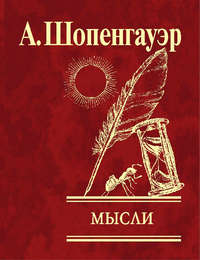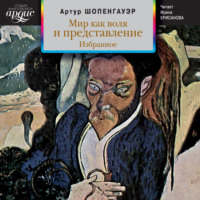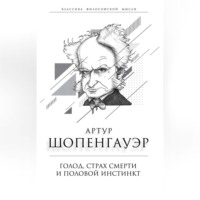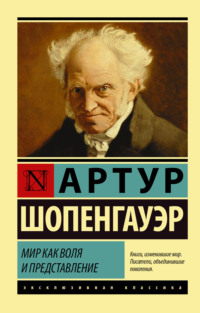 полная версия
полная версияThe World as Will and Idea (Vol. 3 of 3)
In my prize essay on the freedom of the will (p. 50 seq.) I have proved the originality and unalterableness of the inborn character, from which the moral content of the course of life proceeds. It is established as a fact. But in order to understand problems in their full extent it is sometimes necessary to oppose opposites sharply to each other. In this case, then, let one recall how incredibly great is the inborn difference between man and man, in a moral and in an intellectual regard. Here nobleness and wisdom; there wickedness and stupidity. In one the goodness of the heart shines out of the eyes, or the stamp of genius is enthroned in his countenance. The base physiognomy of another is the impression of moral worthlessness and intellectual dulness, imprinted by the hands of nature itself, unmistakable and ineradicable; he looks as if he must be ashamed of existence. But to this outward appearance the inner being really corresponds. We cannot possibly assume that such differences, which transform the whole being of the man, and which nothing can abolish, which, further, in conflict with his circumstances, determine his course of life, could exist without guilt or merit on the part of those affected by them, and be merely the work of chance. Even from this it is evident that the man must be in a certain sense his own work. But now, on the other hand, we can show the source of these differences empirically in the nature of the parents; and besides this, the meeting and connection of these parents has clearly been the work of the most accidental circumstances. By such considerations, then, we are forcibly directed to the distinction between the phenomenon and the true being of things, which alone can contain the solution of that problem. The thing in itself only reveals itself by means of the forms of the phenomenon; therefore what proceeds from the thing in itself must yet appear in those forms, thus also in the bonds of causality. Accordingly it will present itself to us here as a mysterious and incomprehensible guidance of things, of which the external empirical connection would be the mere tool. Yet all that happens appears in this empirical connection introduced by causes, thus necessarily and determined from without, while its true ground lies in the inner nature of what thus manifests itself. Certainly we can here see the solution of the problem only from afar, and when we reflect upon it we fall into an abyss of thought – as Hamlet very truly says, “thoughts beyond the reaches of our souls.” In my essay in the first volume of the Parerga “On the Appearance of Intention in the Fate of Individuals” I have set forth my thoughts upon this mysterious guidance of things, a guidance which indeed can only be conceived symbolically.
In § 14 of my prize essay on the foundation of morals there will be found an exposition of egoism, as regards its nature; and the following attempt to discover its root may be looked upon as supplementary to that paragraph. Nature itself contradicts itself directly, according as it speaks from the individual or the universal, from within or from without, from the centre or the periphery. It has its centre in every individual; for each individual is the whole will to live. Therefore, even if this individual is only an insect or a worm, nature itself speaks out of it thus: “I alone am all in all: in my maintenance everything is involved; the rest may perish, it is really nothing.” So speaks nature from the particular standpoint, thus from the point of view of self-consciousness, and upon this depends the egoism of every living thing. On the other hand, from the universal point of view, – which is that of the consciousness of other things, that of objective knowledge, which for the moment looks away from the individual with whom the knowledge is connected, – from without then, from the periphery nature speaks thus: “The individual is nothing, and less than nothing. I destroy millions of individuals every day, for sport and pastime: I abandon their fate to the most capricious and wilful of my children, chance, who harasses them at pleasure. I produce millions of new individuals every day, without any diminution of my productive power; just as little as the power of a mirror is exhausted by the number of reflections of the sun, which it casts on the wall one after another. The individual is nothing.” Only he who knows how to really reconcile and eliminate this patent contradiction of nature has a true answer to the question as to the perishableness and imperishableness of his own self. I believe I have given, in the first four chapters of this fourth book of the supplements, an adequate introduction to such knowledge. What is said above may further be illustrated in the following manner. Every individual, when he looks within, recognises in his nature, which is his will, the thing in itself, therefore that which everywhere alone is real. Accordingly he conceives himself as the kernel and centre of the world, and regards himself as of infinite importance. If, on the other hand, he looks without, then he is in the province of the idea the mere phenomenon, where he sees himself as an individual among an infinite number of other individuals, accordingly as something very insignificant, nay, vanishing altogether. Consequently every individual, even the most insignificant, every I, when regarded from within, is all in all; regarded from without, on the other hand, he is nothing, or at least as good as nothing. Hence upon this depends the great difference between what each one necessarily is in his own eyes and what he is in the eyes of others, consequently the egoism with which every one reproaches every one else.
In consequence of this egoism our fundamental error of all is this, that with reference to each other we are reciprocally not I. On the other hand, to be just, noble, and benevolent is nothing else than to translate my metaphysics into actions. To say that time and space are mere forms of our knowledge, not conditions of things in themselves, is the same as to say that the doctrine of metempsychosis, “Thou shalt one day be born as him whom thou now injurest, and in thy turn shalt suffer like injury,” is identical with the formula of the Brahmans, which has frequently been mentioned, Tat twam asi, “This thou art.” All true virtue proceeds from the immediate and intuitive knowledge of the metaphysical identity of all beings, which I have frequently shown, especially in § 22 of my prize essay on the foundation of morals. But just on this account it is not the result of a special pre-eminence of intellect; on the contrary, even the weakest intellect is sufficient to see through the principium individuationis, which is what is required in this matter. Accordingly we may find the most excellent character even in the case of a very weak understanding. And further, the excitement of our sympathy is accompanied by no exertion of our intellect. It rather appears that the requisite penetration of the principium individuationis would be present in every one if it were not that the will opposes this, and by virtue of its immediate mysterious and despotic influence upon the intellect generally prevents it from arising; so that ultimately all guilt falls back upon the will, as indeed is in conformity with the fact.
The doctrine of metempsychosis, touched on above, deviates from the truth merely through the circumstance that it transfers to the future what already is now. It makes my true inner nature exist in others only after my death, while, according to the truth, it already lives in them now, and death merely removes the illusion on account of which I am not aware of this; just as an innumerable host of stars constantly shine above our heads, but only become visible to us when the one sun near the earth has set. From this point of view my individual existence, however much, like that sun, it may outshine everything, appears ultimately only as a hindrance which stands between me and the knowledge of the true extent of my being. And because every individual, in his knowledge, is subject to this hindrance, it is just individuation that keeps the will to live in error as to its own nature; it is the Mâyâ of Brahmanism. Death is a refutation of this error, and abolishes it. I believe that at the moment of death we become conscious that it is a mere illusion that has limited our existence to our person. Indeed empirical traces of this may be found in several states which are related to death by the abolition of the concentration of consciousness in the brain, among which the magnetic sleep is the most prominent; for in it, if it reaches a high degree, our existence shows itself through various symptoms, beyond our persons and in other beings, most strikingly by direct participation in the thoughts of another individual, and ultimately even by the power of knowing the absent, the distant, and even the future, thus by a kind of omnipresence.
Upon this metaphysical identity of the will, as the thing in itself, in the infinite multiplicity of its phenomena, three principal phenomena depend, which may be included under the common name of sympathies: (1) sympathy proper, which, as I have shown, is the basis of justice and benevolence, caritas; (2) sexual love, with capricious selection, amor, which is the life of the species, that asserts its precedence over that of the individual; (3) magic, to which animal magnetism and sympathetic cures also belong. Accordingly sympathy may be defined as the empirical appearance of the metaphysical identity of the will, through the physical multiplicity of its phenomena, whereby a connection shows itself which is entirely different from that brought about by means of the forms of the phenomenon which we comprehend under the principle of sufficient reason.
Chapter XLVIII.44On The Doctrine Of The Denial Of The Will To Live
Man has his existence and being either with his will, i. e., his consent, or without this; in the latter case an existence so embittered by manifold and insupportable sufferings would be a flagrant injustice. The ancients, especially the Stoics, also the Peripatetics and Academics, strove in vain to prove that virtue sufficed to make life happy. Experience cried out loudly against it. What really lay at the foundation of the efforts of these philosophers, although they were not distinctly conscious of it, was the assumed justice of the thing; whoever was without guilt ought to be free from suffering, thus happy. But the serious and profound solution of the problem lies in the Christian doctrine that works do not justify. Accordingly a man, even if he has practised all justice and benevolence, consequently the αγαθον, honestum, is yet not, as Cicero imagines, culpa omni carens (Tusc., v. i.); but el delito mayor del hombre es haber nacido (the greatest guilt of man is that he was born), as Calderon, illuminated by Christianity, has expressed it with far profounder knowledge than these wise men. Therefore that man comes into the world already tainted with guilt can appear absurd only to him who regards him as just then having arisen out of nothing and as the work of another. In consequence of this guilt, then, which must therefore have proceeded from his will, man remains rightly exposed to physical and mental suffering, even if he has practised all those virtues, thus is not happy. This follows from the eternal justice of which I have spoken in § 63 of the first volume. That, however, as St. Paul (Rom. iii. 21), Augustine, and Luther teach, works cannot justify, inasmuch as we all are and remain essentially sinners, ultimately rests upon the fact that, because operari sequitur esse, if we acted as we ought, we would necessarily be as we ought. But then we would require no salvation from our present condition, which not only Christianity but also Brahmanism and Buddhism (under the name which is expressed in English by final emancipation) present as the highest goal, i. e., we would not need to become something quite different from, nay, the very opposite of what we are. Since, however, we are what we ought not to be, we also necessarily do what we ought not to do. Therefore we need a complete transformation of our mind and nature; i. e., the new birth, as the result of which salvation appears. Although the guilt lies in action, operari, yet the root of the guilt lies in our essentia et existentia, for out of these the operari necessarily proceeds, as I have shown in the prize essay on the freedom of the will. Accordingly our one true sin is really original sin. Now the Christian myth makes original sin first arise after man came into existence, and for this purpose ascribes to him, per impossibile, a free will. It does this, however, simply as myth. The inmost kernel and spirit of Christianity is identical with that of Brahmanism and Buddhism; they all teach a great guilt of the human race through its existence itself, only that Christianity does not proceed directly and frankly like these more ancient religions: thus does not make the guilt simply the result of existence itself, but makes it arise through the act of the first human pair. This was only possible under the fiction of a liberum arbitrium indifferentiæ, and only necessary on account of the Jewish fundamental dogma, in which that doctrine had here to be implanted. Because, according to the truth, the coming into existence of man himself is the act of his free will, and accordingly one with the fall, and therefore the original sin, of which all other sins are the result, appeared already with the essentia and existentia of man; but the fundamental dogma of Judaism did not admit of such an explanation. Thus Augustine taught, in his books De libero arbitrio, that only as Adam before the fall was man guiltless and possessed of a free will, but for ever after is involved in the necessity of sin. The law, ὁ νομος, in the Biblical sense, always demands that we shall change our doing, while our being remains unchanged. But because this is impossible, Paul says that no man is justified by the law; only the new birth in Jesus Christ, in consequence of the work of grace, on account of which a new man arises and the old man is abolished (i. e., a fundamental change of mind or conversion), can transfer us from the state of sinfulness into that of freedom and salvation. This is the Christian myth with reference to ethics. But certainly the Jewish theism, upon which it was grafted, must have received wonderful additions to adapt itself to that myth. In it the fable of the fall presented the only place for the graft of the old Indian stem. It is to be attributed just to that forcibly surmounted difficulty that the Christian mysteries have received such an extraordinary appearance, conflicting with the ordinary understanding, which makes proselytising more difficult, and on account of which, from incapacity to comprehend their profound meaning, Pelagianism, or at the present day Rationalism, rises against them, and seeks to explain them away, but thereby reduces Christianity to Judaism.
But to speak without myth: so long as our will is the same, our world can be no other than it is. It is true all wish to be delivered from the state of suffering and death; they would like, as it is expressed, to attain to eternal blessedness, to enter the kingdom of heaven, only not upon their own feet; they would like to be carried there by the course of nature. That, however, is impossible. Therefore nature will never let us fall and become nothing; but yet it can lead us nowhere but always again into nature. Yet how questionable a thing it is to exist as a part of nature every one experiences in his own life and death. Accordingly existence is certainly to be regarded as an erring, to return from which is salvation: it also bears this character throughout. It is therefore conceived in this manner by the ancient Samana religions, and also, although indirectly, by real and original Christianity. Even Judaism itself contains at least in the fall (this its redeeming feature) the germ of such a view. Only Greek paganism and Islamism are entirely optimistic: therefore in the former the opposite tendency had to find expression at least in tragedy; but in Islamism, which is the worst, as it is the most modern, of all religions, it appeared as Sufism, that very beautiful phenomenon, which is completely of Indian spirit and origin, and has now continued for upwards of a thousand years. Nothing can, in fact, be given as the end of our existence but the knowledge that we had better not be. This, however, is the most important of all truths, which must therefore be expressed, however great the contrast in which it stands with the European manner of thought of the present day. On the other hand, in the whole of non-Mohammedan Asia it is the most universally recognised fundamental truth, to-day as much as three thousand years ago.
If now we consider the will to live as a whole and objectively, we have, in accordance with what has been said, to think of it as involved in an illusion, to escape from which, thus to deny its whole existing endeavour, is what all religions denote by self-renunciation, abnegatio sui ipsius; for the true self is the will to live. The moral virtues, thus justice and benevolence, since if they are pure they spring, as I have shown, from the fact that the will to live, seeing through the principium individuationis, recognises itself in all its manifestations, are accordingly primarily a sign, a symptom, that the self-manifesting will is no longer firmly held in that illusion, but the disillusion already begins to take place; so that one might metaphorically say it already flaps its wings to fly away from it. Conversely, injustice, wickedness, cruelty are signs of the opposite, thus of the deep entanglement in that illusion. Secondly, however, these virtues are a means of advancing self-renunciation, and accordingly the denial of the will to live. For true integrity, inviolable justice, this first and most important of cardinal virtues, is so hard a task that whoever professes it unconditionally and from the bottom of his heart has to make sacrifices that soon deprive life of the sweetness which is demanded to make it enjoyable, and thereby turn away the will from it, thus lead to resignation. Yet just what makes integrity honourable is the sacrifices which it costs; in trifles it is not admired. Its nature really consists in this, that the just man does not throw upon others, by craft or force, the burdens and sorrows which life brings with it, as the unjust man does, but bears himself what falls to his lot; and thus he has to bear the full burden of the evil imposed upon human life, undiminished. Justice thereby becomes a means of advancing the denial of the will to live, for want and suffering, those true conditions of human life, are its consequence, and these lead to resignation. Still more quickly does the virtue of benevolence, caritas, which goes further, lead to the same result; for on account of it one takes over even the sufferings which originally fell to the lot of others, therefore appropriates to oneself a larger share of these than in the course of things would come to the particular individual. He who is inspired with this virtue has recognised his own being in all others. And thereby he identifies his own lot with that of humanity in general; but this is a hard lot, that of care, suffering, and death. Whoever, then, by renouncing every accidental advantage, desires for himself no other lot than that of humanity in general cannot desire even this long. The clinging to life and its pleasures must now soon yield, and give place to a universal renunciation; consequently the denial of the will will take place. Since now, in accordance with this, poverty, privation, and special sufferings of many kinds are introduced simply by the perfect exercise of the moral virtues, asceticism in the narrowest sense, thus the surrender of all possessions, the intentional seeking out of what is disagreeable and repulsive, self-mortification, fasts, the hair shirt, and the scourge – all this is rejected by many, and perhaps rightly, as superfluous. Justice itself is the hair shirt that constantly harasses its owner and the charity that gives away what is needed, provides constant fasts.45 Just on this account Buddhism is free from all strict and excessive asceticism, which plays a large part in Brahmanism, thus from intentional self-mortification. It rests satisfied with the celibacy, voluntary poverty, humility, and obedience of the monks, with abstention from animal food, as also from all worldliness. Since, further, the goal to which the moral virtues lead is that which is here pointed out, the Vedanta philosophy46 rightly says that after the entrance of true knowledge, with entire resignation in its train, thus the new birth, then the morality or immorality of the past life is a matter of indifference, and uses here also the saying so often quoted by the Brahmans: “Finditur nodus cordis, dissolvuntur omnes dubitationes, ejusque opera evanescunt, viso supremo illo” (Sancara, sloca 32).
Now, however objectionable this view may be to many, to whom a reward in heaven or a punishment in hell is a much more satisfactory explanation of the ethical significance of human action, just as the good Windischmann rejects that doctrine, while he expounds it, yet whoever is able to go to the bottom of the matter will find that in the end it agrees with that Christian doctrine especially urged by Luther, that it is not works but only the faith which enters through the work of grace, that saves us, and that therefore we can never be justified by our deeds, but can only obtain the forgiveness of our sins through the merits of the Mediator. It is indeed easy to see that without such assumptions Christianity would have to teach infinite punishment for all, and Brahmanism endless re-births for all, thus no salvation would be reached by either. The sinful works and their consequences must be annulled and annihilated, whether by extraneous pardon or by the entrance of a better knowledge; otherwise the world could hope for no salvation; afterwards, however, they become a matter of indifference. This is also the μετανοια και αφεσις ἁμαρτιων, the announcement of which the risen Christ exclusively imposes upon His Apostles as the sum of their mission (Luke xxiv. 47). The moral virtues are really not the ultimate end, but only a step towards it. This step is signified in the Christian myth by the eating of the tree of the knowledge of good and evil, with which moral responsibility enters, together with original sin. The latter itself is in truth the assertion of the will to live: the denial of the will to live, in consequence of the appearance of a better knowledge, is, on the other hand, salvation. Between these two, then, lies the sphere of morality; it accompanies man as a light upon his path from the assertion to the denial of the will, or, mythically, from original sin to salvation through faith in the mediation of the incarnate God (Avatar); or, according to the teaching of the Vedas, through all re-births, which are the consequence of the works in each case, until right knowledge appears, and with it salvation (final emancipation), Mokscha, i. e., reunion with Brahma. The Buddhists, however, with perfect honesty, only indicate the matter negatively, by Nirvana, which is the negation of this world, or of Sansara. If Nirvana is defined as nothing, this only means that the Sansara contains no single element which could assist the definition or construction of Nirvana. Just on this account the Jainas, who differ from the Buddhists only in name, call the Brahmans who believe in the Vedas Sabdapramans, a nickname which is meant to signify that they believe upon hearsay what cannot be known or proved (“Asiat. Researches,” vol. vi. P. 474).
When certain ancient philosophers, such as Orpheus, the Pythagoreans, and Plato (e. g., in the “Phædo,” pp. 151, 183 seq., Bip.; and see Clem. Alex. strom., iii. p. 400 seq.), just like the Apostle Paul, lament the union of soul and body, and desire to be freed from it, we understand the real and true meaning of this complaint, since we have recognised, in the second book, that the body is the will itself, objectively perceived as a phenomenon in space.









